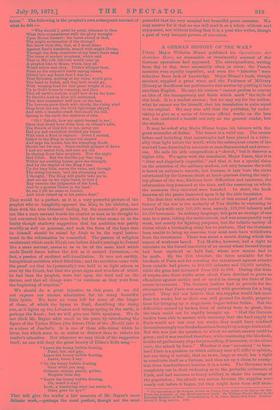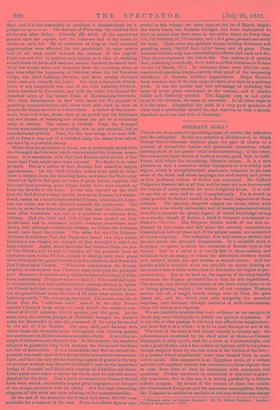A GERMAN HISTORY OF THE WAR.* Ihrrn. Major Wilhelm Blume
published his Operationen der dentschen Heere, no reasonable or trustworthy account of the German operations had appeared. The correspondents, 'writing
from day to day, were necessarily often in error; the French memoirs were equally imperfect, and even the "histories" were defective from lack of knowledge. Major Blume's book, though succinct, supplied a great want, and the Professor of Military History at Sandhurst has performed a real service by patting it into. excellent English. He says his version "cannot profess to convey an idea of the transparency and finish which mark" the style of this book. It is a modest avowal ; but we may say for the author, what he cannot say for himself, that his translation is quite equal to the original. We may also add that the publisher, by under-. taking to give us a series of German official works on the late war, has conferred a benefit not only on the general reader, but the student.
It may be asked why Major Blume began his labours with the great surrender of Sedan. The reason is a valid one. The events before and including that catastrophe had been placed in a toler- ably clear light before the world, while the subsequent course of the war had been described in accounts at once disconnected and errone- ous. He calls his able compendium a "sketch," but it deserves a higher title. We agree with the translator, Major Jones, that it is "clear and singularly impartial," and that it has a special claim on the attention of the military student, not only because the work is based on authentic records, but because it lays bare the views. entertained by the German chiefs at head-quarters during the vary- ing phases of the war, discloses their difficulties and resources, the information they possessed at the time, and the reasoning on which the measures they executed were founded. In short, the book deserves all the praise bestowed upon it by the able translator.
The first fact which strikes the reader of this second part of the history of the war is the audacity of Von Moltke in venturing to invest Paris with only 146,000 men, namely, 122,000 infantry and 24,000 horsemen. In military language, this gave an average of one man to a pace, taking the entire circuit, and was consequently very weak, not merely for fighting purposes, but the infinite variety of duties which a blockading army has to perform. Had the Germans. been unable to bring up reserves, they must soon have withdrawn from the investment. There was about a month during which the season of weakness lasted. Von Moltke, however, had a right to calculate on the forced inactivity of an enemy whose formed troops. had been captured or held fast, whose new armies had to be made. By the 21st October, the force available for the of Paris and for covering the investment against attacks- from outside had grown to 202,031 infantry and 33,803 cavalry, while the guns had increased from 622 to 898. During this time of respite also those works arose about Paris destined to prove so efficacious against sorties and so useful in closing the links of the- severe investment. The German leaders had to provide for the alternative that Paris was amply stored with provisions for a long. period. They did not believe that the supplies would last more than ten weeks, but as there was still ground for doubt, prepara- tions for bringing up a siege-train began before Sedan. But the- difficulties caused by broken lines of railway were so great, that the train- could not be rapidly brought up. "Had the German leaders been able to assume with certainty that the food supply in. Paris would not last over ten weeks, they would have coiffined. themsel yes simply to a blockade and n o t brought up a siege-train at all. But this was just the question to which no certain answer could be ; and it was resolved therefore, while continuing the blockade, to take all preliminary steps for proceeding, if necessary, to the ultimcr ratio, the attack by force." Whether it was " necessary " to bom- bard Paris is a question on which military men will differ in opinion,. but one thing is certain, that no town, large or small, has e right. to constitute itself as a fortress, and then set up a claim to exemp- tion from bombardment because it is a town. The Germans were completely out in their reckoning as to the probable endurance of Paris, and had recourse to heavy artillery to shake the courage of the population ; the attack was useless because the supplies were, nearly out before it began, yet they might have been still abun-
The Operations of the German Armies in France, from Sedan to the End of the War. From the Journals of the Head-quarters' Staff. By William Blumd. Major in tho Prussian Ministry of War. Translated by E. IL Jones, Major 20th Foot. London Henry S. Ling and Co. 1812.
dant, and it is not reasonable to condemn a bombardment by a judgment apre.s coup. The defence of Paris was the cardinal fact of the war after Sedan. Literally tGe whole of the operations pivoted upon the capital, and the Germans had ev ery reason to desire its early fall. By its resistance as long as food remained opportunities were afforded for the provincials to raise armies and do all they could towards the succour of the capital. Paris was not able to perform any exploit save that of retaining round about its forts and bastions several hundred thousand men. Very few troops were ever detached from the investing army at any time after the beginning of October, when the 1st Bavarian Corps, the 22nd Infantry Division, and three cavalry divisions were sent out towards the Loire. The only subsequent detach- ment of any magnitude was that of the 17th Infantry Division, which marched in November, and with the other two formed the detached army of the Grand Duke of Mecklenberg-Schwerin. The other detachments at first were made for the purpose of guarding communications, and these were sent back as soon as Landwehr troops arrived to relieve them. A review of the invest- ment, from both eider, shows that at no period had the Parisians any real chance of breaking out without the aid of a victorious army of succour. The reason is twofold. First, the besieged forces were relatively poor in quality, not as raw material, but as manufactured articles. Next, for the beat troops it is most diffi- cult to force a way out of a fortified camp the issues from which are held by a powerful enemy.
When they are presented in detail, one is profoundly struck with the foresight and decision which characterised the German opera- tions. It is sometimes said that had Bazaine held out for a few more days Paris might have been relieved. We doubt it on other grounds. But as a matter of fact, Bazaine had ceased to inspire apprehension. On the 23rd October orders went forth to with- draw a division from the investing force, and since the Metz army dared not fight in the open for want of guns, horses, supplies, had the need been pressing, more troops would have been hurried up from the Moselle to the Loire. It was also decided on the 23rd that the Red Prince's army should, as soon as Bazaine had surren- dered, hasten on a broad front towards Orleans, while the 1st Army, less one corps, was to be directed towards the north-west. The truth is, as we have heretofore pointed out, that the Loire Army, even after Coulmiers, was not in a condition to advance from Orleans. Had the 15th and 16th Corps been pushed on, they would have had to encounter 50,000 Germans somewhere near Toury, and, although numerically inferior, we believe the Germans would have been the victors. The order for the 17th Infantry Division to reinforce Von der Tann was issued two days before Coulmiers was fought, an example of that foresight to which we have referred. Again, when Bourbaki had vanished from the ken of Von Moltke, and be had to consider all the probable lines of operation open to the French, instead of waiting until their plans were developed, the great General took the initiative, and threw the Red Prince upon Chanzy. "Whatever combination the French adopted, it was evident that Chanzy's army must play the principal part. Moreover, it was this army which threatened the siege of Paris most immediately. We knew where to find it ; if we could fall upon it unexpectedly and with sufficient force, perhaps destroy it, before the French had time to carry out their designs, we should at once cut the ground from under the feet of all their other armies, Boar- baki's especially." The reasoning was sound. The reader may like to know that the "sufficient force" moved by the Red Prince against Chanzy's large army (at least double the number) con- sisted of 57,737 infantry, 15,426 cavalry, and 318 guns. At the same time, the earliest glimpse of Bourbaki brought the decisive order for Manteuffel to take the command of the corps forwarded to the aid of Von Werder. The care, skill, and decision with which these two Generals acted throughout that stirring episode the movement on Belfort deserves attentive study. It is a fine ex- ample of defensive and offensive war. In like manner, the measures adopted to guard the long flank between the Same and the Seine are full of instruction. It is a remarkable fact that no serious im- pression was made upon either the northern or southern communica- tions, and that the only stroke showing a spark of genius in the way of partisan warfare was Menotti Garibaldi's dash at the important bridge of Frouard and Ricciotti's surprise of Chatillon-sur-Seine. .Great pains were taken to secure the roads, and an especial service detailed for the duty. That a point so essential as Fronard should have been struck successfully argues great negligence on the part of the troops entrusted with its safety. Not the least interesting chapters of this work are those relating to the communications.
At the end of the armistice the French had about 250,000 men available for a renewal of the war. From the official figures pre-
sented in this volume we learn that on the 1st of March, despits the heavy losses, the German strength had been replenished to such an extent that there were in the active Army no fewer than 455,782 infantry, 57,779 cavalry, and 1,674 guns, present and ready for work. There were also garrison troops, holding fortresses and guarding roads, 114,093 foot, 5,686 horse, and 68 guns. These numbers include only non-commissioned officers and rank and file. They do not represent the ration-list. Our author is of opinion that, reckoning everybody, there were a million Germans in France on the 1st March, 1871. In Germany there were 250,000 men, reserve and garrison troops,—pretty clear proof of the surpassing excellence of German military organisation. Major Blume's book contains one of the beet maps we have ever seen in a military work. It has the special and rare advantage of including the name of every place mentioned in the volume, and is besides boldly and distinctly printed. The English copy is not quite equal to the German, we mean in execution. In all other respects it is the same. Altogether the book is a very good specimen of what such a production should be, and deserves as wide a success elsewhere as it has met with in Germany.



































 Previous page
Previous page